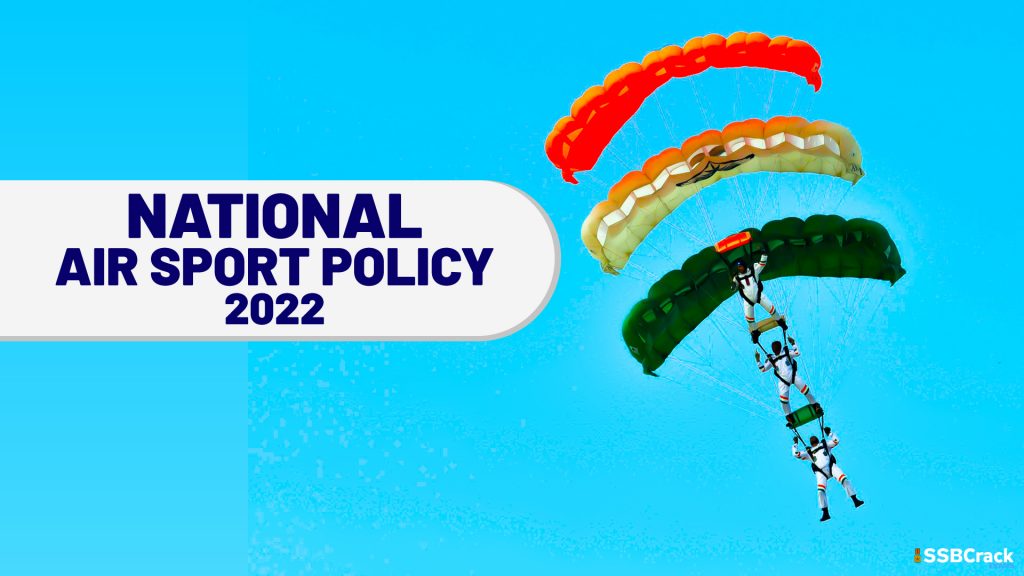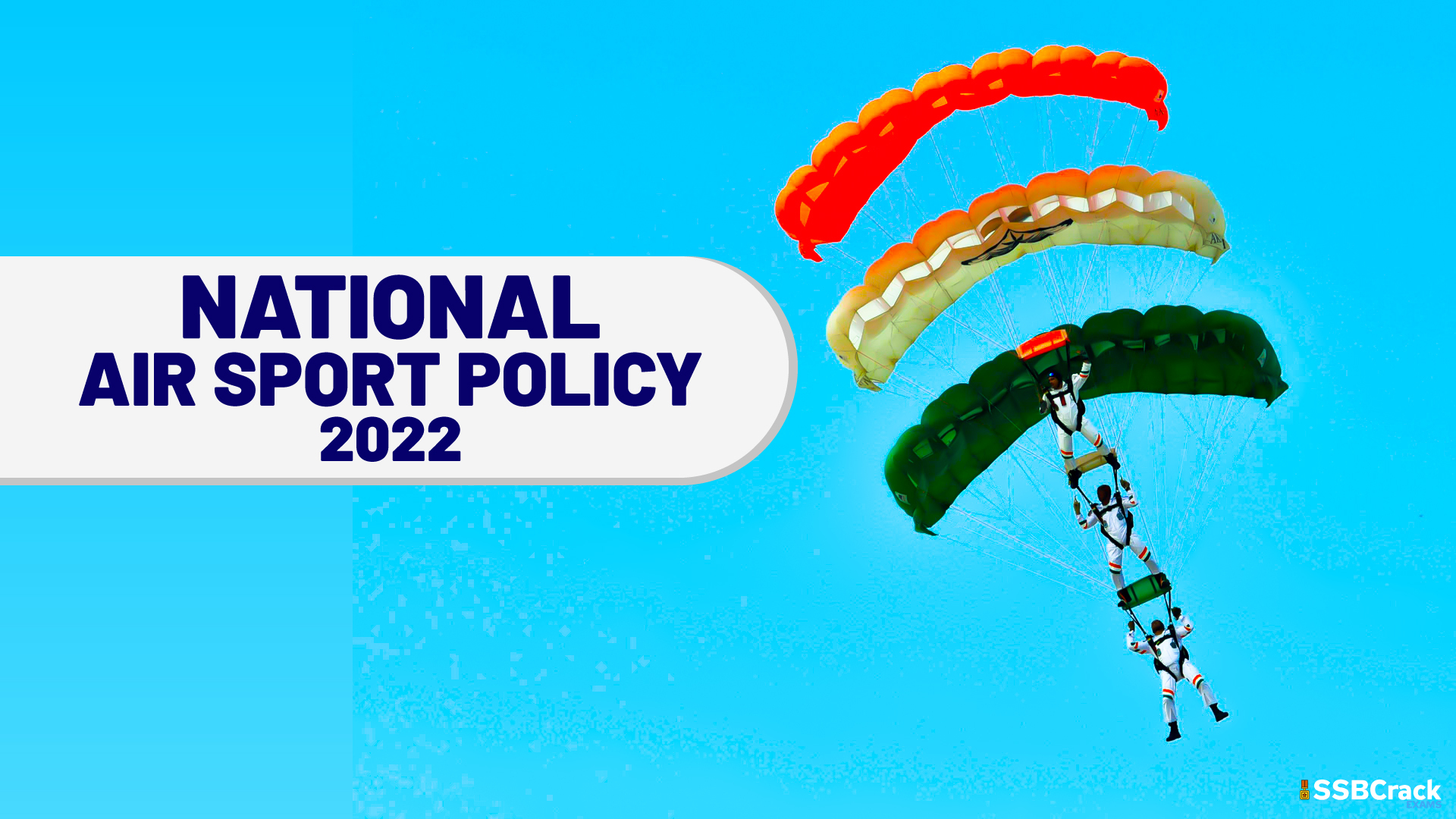The Minister of Civil Aviation Shri Jyotiraditya M. Scindia today launched National Air Sport Policy 2022 (NASP 2022). NASP 2022 lays out the vision of making India as one of the top sports nations by 2030, by providing a safe, affordable, accessible, enjoyable and sustainable air sports ecosystem in India.

The event was graced by Shri Rajiv Bansal, Secretary, Ministry of Civil Aviation (MoCA), Shri Sanjeev Kumar, Chairman, Airport Authority of India (AAI), Shri Amber Dubey, Joint Secretary, MoCA, Smt. Rubina Ali, Joint Secretary, MoCA, Shri SK Mishra, Joint Secretary, MoCA, Shri Piyush Srivastava, Senior Economic Advisor, MoCA, Shri PK Thakur, Deputy Director General, MoCA and other dignitaries from AAI, MoCA, DGCA and BCAS.
Air sports, as the names suggests, encompasses various sports activities involving the medium of air. These include sports like air-racing, aerobatics, aero modeling, hang gliding, paragliding, para motoring and skydiving etc. India has the potential to be among the leading nations in the world of air sports. It has a large geographical expanse, diverse topography, and fair-weather conditions. It has a large population, especially the youth. It has a growing culture for adventure sports and aviation. The NASP 2022, is a step in this direction. It has been drafted based on the inputs received from policy makers, air sports practitioners and public at large and will ensure establishment of good quality of infrastructure, equipment, instructors and services.
The policy will cover the following air sports in India: –
- Aerobatics
- Aero modeling and model rocketry
- Amateur-built and experimental aircraft
- Ballooning
- Drones
- Gliding and powered gliding
- Hang gliding and powered hang gliding
- Parachuting (including skydiving, BASE jumping and wing suits etc.)
- Paragliding and para motoring (including powered parachute trikes etc.)
- Powered aircraft (including ultra light, micro light and light sports aircraft etc.)
- Rotorcraft (including autogyro)
Under the new policy, there will be four-tier governance structure for air sports in India namely
- Air Sports Federation of India (ASFI) as the apex governing body
- National associations for individual air sports or a set of air sports, as appropriate
- Regional (e.g. West/ South/ North East etc.) or State and Union Territory level units of the national air sports associations, as appropriate; and
- District-level air sports associations, as appropriate.
Shri Jyotiraditya M. Scindia, Union Minister of Civil Aviation said, “It is time for India to take its rightful place and become global capital of air sports. We want to create an environment of adventure, thrill and sports in the country. For this, we will leverage the energy of our youth below the age of 35 which accounts for 70 percent of India’s population which is larger than the total population of Europe and three times that of USA. India has a huge geographical expanse, extending from the Himalayas and the mountainous regions to our states in the northeast to the plains in central India to the coastal regions on the western-eastern coastline, and therefore you have the ability in this country to have the widest diversity of air sports”
The policy, according to Minister, will serve to attract air sports enthusiasts from all over the world, especially those who live in areas where harsh winters prevent them from participating. He believes that air sports enthusiasts from Europe, North America, and Australia would flock to India to practice in the winters.
Speaking on the future of Air Sports in India, he said “From a small market size of around 5,000 odd air sports practitioners creating around Rs 80-100 crore of annual revenue in India, I feel we can target over Rs 8,000 – 10,000 crore annual revenue and generate over 1,00,000 direct jobs. The economic multiplier benefits in terms of travel, tourism, support services and local infrastructure development will be over three times.”
Minister of Civil Aviation Shri Jyotiraditya M. Scindia also interacted with 2 Indian Air Sports Players – Ms. Shital Mahajan and Ms. Rachel Thomas. Both are sky drivers and Padma-Shri awardees. Ms. Shital Mahajan is known as the first woman to perform an accelerated free fall jump over the Antarctica from 10,000 feet, the youngest woman to jump over both the North and South Poles and the first woman jumper to perform it without trials while Ms. Rachel Thomas was the first Indian woman to skydive from 7,000 feet over the North Pole. Both Air sports enthusiasts expressed their gratitude for introducing National Air Sports Policy which will help India become air sports hub by 2030.
Key Objectives of NASP 2022:-
- Promote an air sports culture in the country
- Enable adoption of international good practices in safety including but not limited to, air sports infrastructure, equipment, operations, maintenance and training
- Develop a simple, stakeholder-friendly and effective governance structure
- Enhance participation and success of Indian sportspersons in global air sports events; and
- Promote design, development and manufacturing of air sports equipment in India in line with the Atmanirbhar Bharat Abhiyan.
To crack the SSB interview, You can join our SSB interview live classes batch and we recommend you to Enroll SSB INTERVIEW ONLINE COURSE. Trusted by thousands of defence aspirants.
Also Read:







